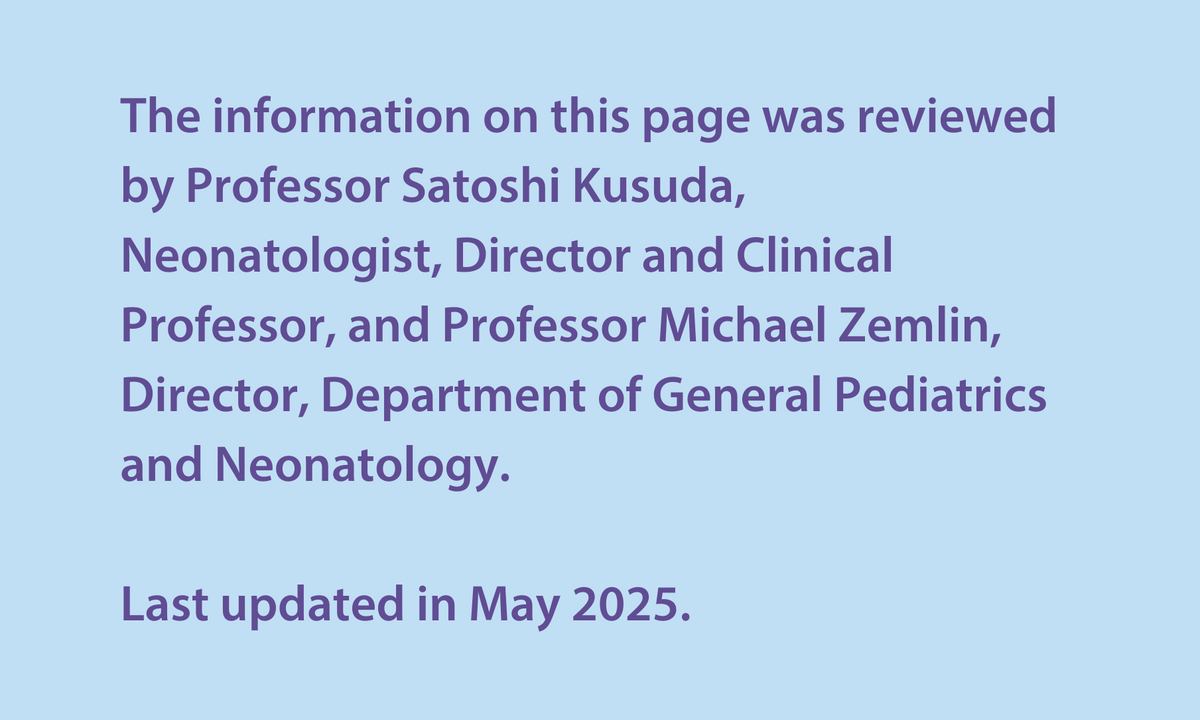Please consider reading the information that is relevant to you and your little one(s). By doing so, you can avoid overwhelming yourself with too much information in an already distressing time.

Infection happens when organisms like bacteria, viruses, or fungi invade the body. Even normal body organisms can become infectious if a baby's immunity is weakened. Infections can affect different body parts with varying severity levels, such as the lungs (RSV⍰, bronchiolitis⍰, pneumonia⍰), blood (sepsis⍰), the fluid around the spinal cord⍰ and brain (meningitis), or genitalia (neonatal urinary tract infection⍰, neonatal herpes, Group B strep⍰). You can lower the chances of your little one(s) catching any common infectious diseases during your stay in a neonatal unit or at home by simple measures such as washing your hands thoroughly, using disposable tissues, and avoiding people who are unwell and showing signs of an infectious disease like a cold or the flu⍰.
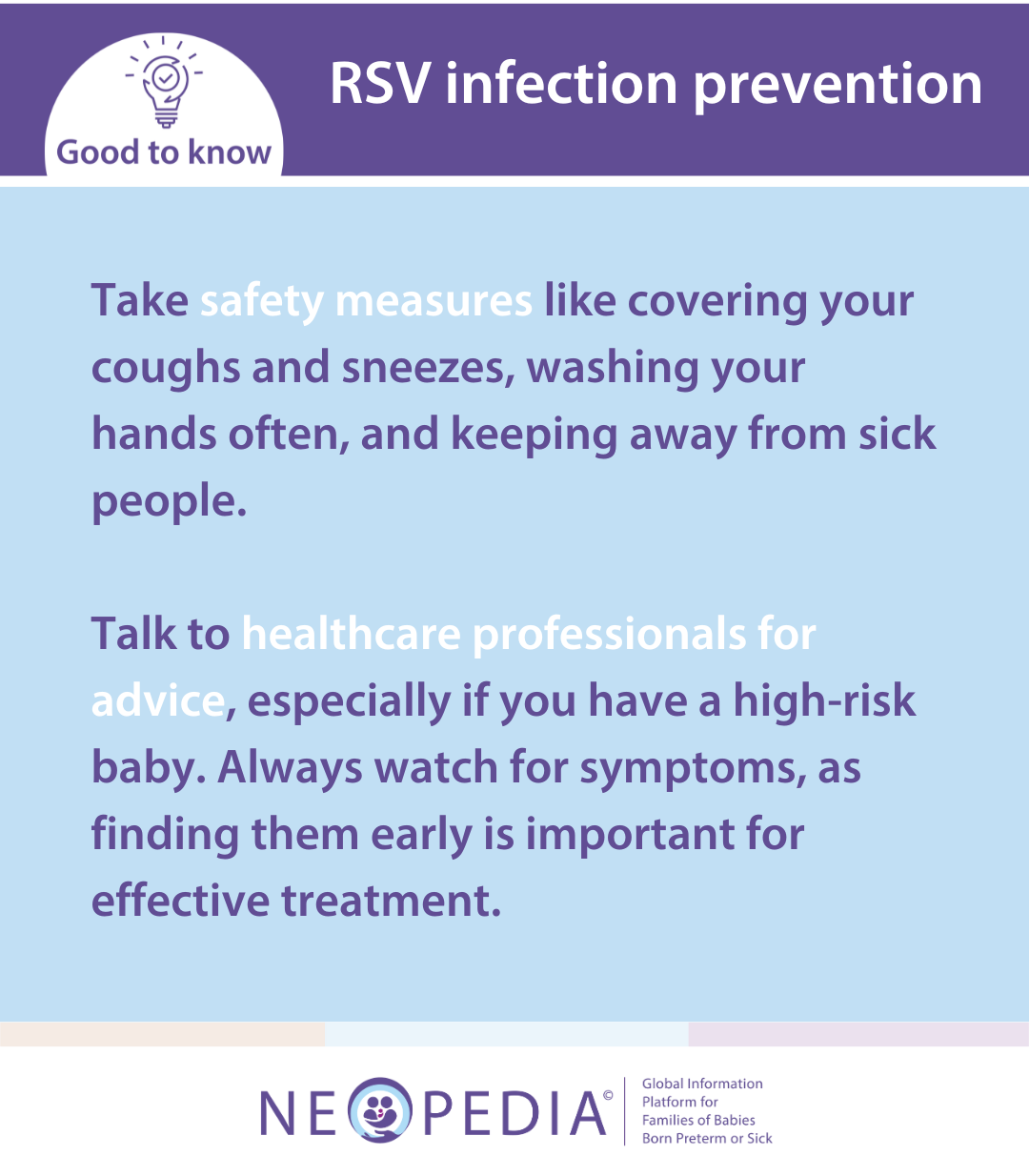
Respiratory syncytial virus (RSV) is a common illness affecting the lungs and airways. It is highly contagious, especially during colder months. RSV mostly affects infants and young children after discharge from hospital and before the age of two, particularly preterm babies and those with weakened immune systems or chronic conditions. Vaccination⍰ programs of many countries include vaccination against RSV.
Symptoms include cold-like symptoms, coughing, wheezing, and difficulty breathing. Diagnosis is confirmed through medical examination and tests like chest X-rays⍰. Treatment focuses on relieving symptoms, as there is no cure for RSV. Babies may need oxygen, fluids, and supportive care.
RSV spreads through respiratory droplets from coughing or sneezing. It can also survive on surfaces, making hand hygiene crucial in preventing infection. Most cases of RSV result in mild cold-like symptoms. However, severe cases can lead to bronchiolitis⍰, pneumonia⍰, BPD⍰, or even loss of life, especially in vulnerable infants.
Bronchiolitis is a common lung infection in babies and young children, often caused by viruses like RSV. It usually clears up within a few weeks but can make breathing difficult in some cases.
Babies born preterm or with lung or heart conditions are more vulnerable to severe bronchiolitis. Symptoms include, coughing, fast breathing, wheezing, other cold-like symptoms, and feeding difficulties.
In more severe cases, your baby may be admitted to a hospital where they might receive treatments like oxygen, feeding assistance, continuous positive airway pressure (CPAP)⍰, or mechanical ventilation⍰. If you have any questions or concerns about your baby's care, do not hesitate to talk to the doctors and nurses caring for them.
A newborn can develop pneumonia from infections before birth, during delivery, or shortly after. Infections can be passed on from caregivers or family members visiting in the hospital. Pneumonia can occur any time but peaks in autumn, winter, and spring. It typically begins as a cold or respiratory infection⍰ before progressing to pneumonia.
Group B streptococcus and E. coli are common bacteria causing pneumonia, while viruses like RSV⍰, enterovirus⍰, flu⍰, and COVID-19 can also lead to lung infection. Fungal pneumonia⍰, often from candida, can affect very low birth weight babies.
Pneumonia can range from mild to severe, particularly for preterm babies with underdeveloped immune systems. It fills the air sacs in the lungs with fluid and pus, making breathing difficult. Infections can spread, potentially causing complications like sepsis, where the infection enters the bloodstream, leading to inflammation and in the most serious cases to organ failure.
Sepsis is a severe reaction to an infection, where the body's immune system harms its own tissues and organs. Preterm or sick babies are more prone to infections leading to sepsis due to their weaker immune system and delicate skin and gut. They are also at risk for late-onset sepsis, occurring over 72 hours after birth, often associated with equipment like IV⍰ or ventilation tubes. Most likely, sepsis develops due to the translocation of bacteria from the gut or other body surfaces into the blood. Even full-term babies can develop sepsis, especially if there were complications during pregnancy or labor, like pre-labor rupture of membranes⍰. Early-onset sepsis, within the first 72 hours after birth, is often caused by group B streptococcus or other bacteria transmitted from the mother during delivery.
Spotting sepsis in babies can be tricky as symptoms may overlap with other conditions. Signs include abnormal temperature, breathing issues, skin changes like jaundice⍰ or blueness, and changes in behavior like irritability or feeding difficulties.
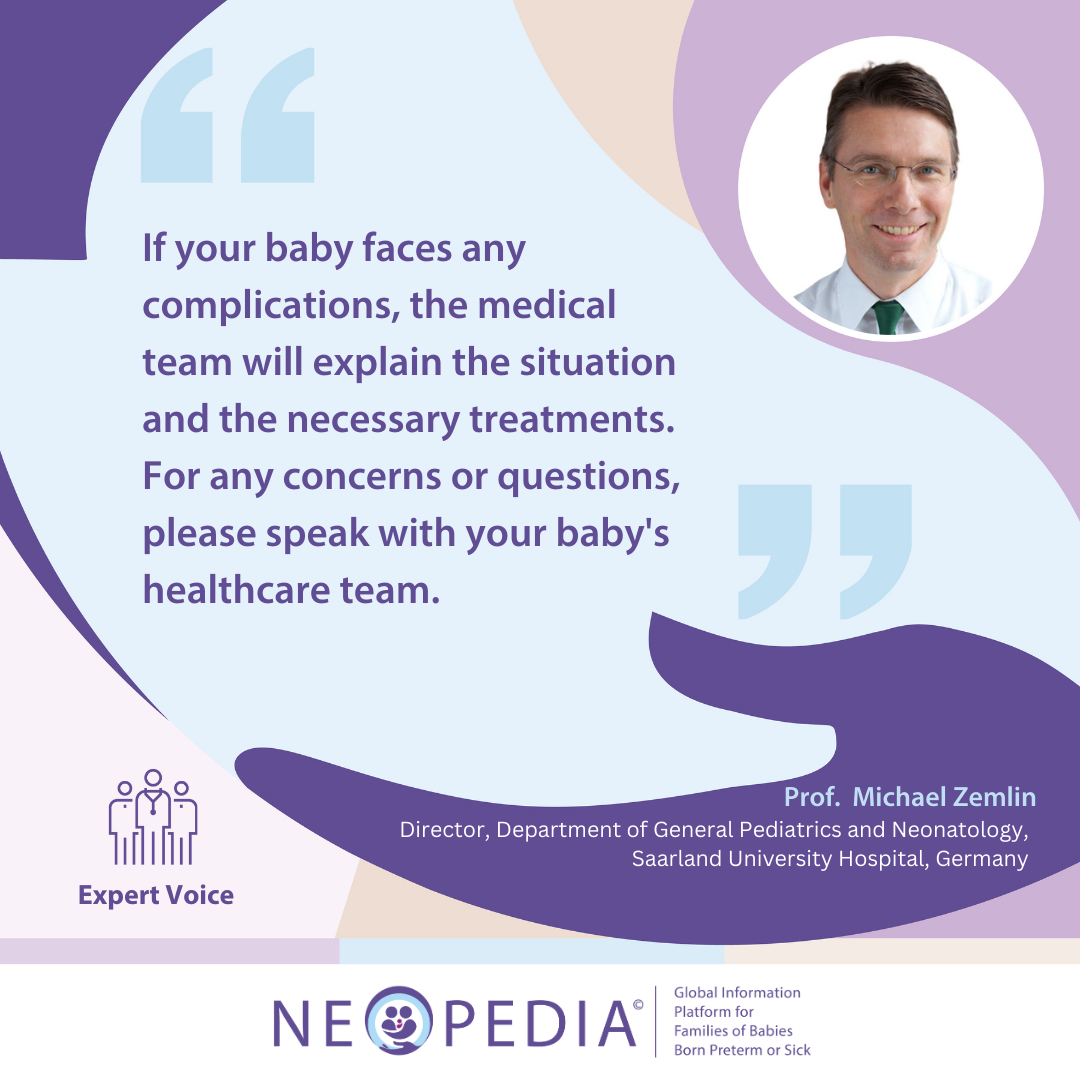
Meningitis is an infection of the membranes⍰, called meninges, surrounding the brain and spinal cord⍰. These membranes protect your baby's brain from injury and infection. Meningitis can be caused by viruses, bacteria, or fungi, with bacterial meningitis being the most frequent. A newborn’s immune system is not fully developed, making them more susceptible to infections. Preterm babies are even more vulnerable due to their less developed immune systems.
Meningitis in newborns is rare but serious and requires urgent treatment. Risk factors include preterm birth, low birth weight (under 1500g), the mother having Group B strep (GBS)⍰ during birth, the membranes rupturing more than 18 hours before a preterm birth, the mother having a high temperature during birth, infection of the placenta⍰ or amniotic fluid⍰ before birth.
Please talk to your healthcare team if you have questions about these risks. If you suspect your newborn is unwell, contact your care team immediately.
If your baby has bacterial meningitis, hospital treatment is required. Severely unwell babies may be cared for in a NICU. Immediate treatment with antibiotics⍰ is crucial. With quick treatment, many babies recover fully from bacterial meningitis. However, some may experience complications due to the infection, such as a build-up of fluid in the brain, which will require further treatment.
A urinary tract infection (UTI) is a bacterial infection that can affect any part of the urinary tract, including the kidneys, ureters (the tubes that carry urine), and the bladder⍰.
Detecting UTIs in newborns, especially preterm babies, can be challenging as they often do not show clear symptoms. In many cases, an unexplained fever is the only noticeable sign, happening in about 5 percent of babies with a fever. This absence of clear symptoms leads to many UTIs in infants going unnoticed.
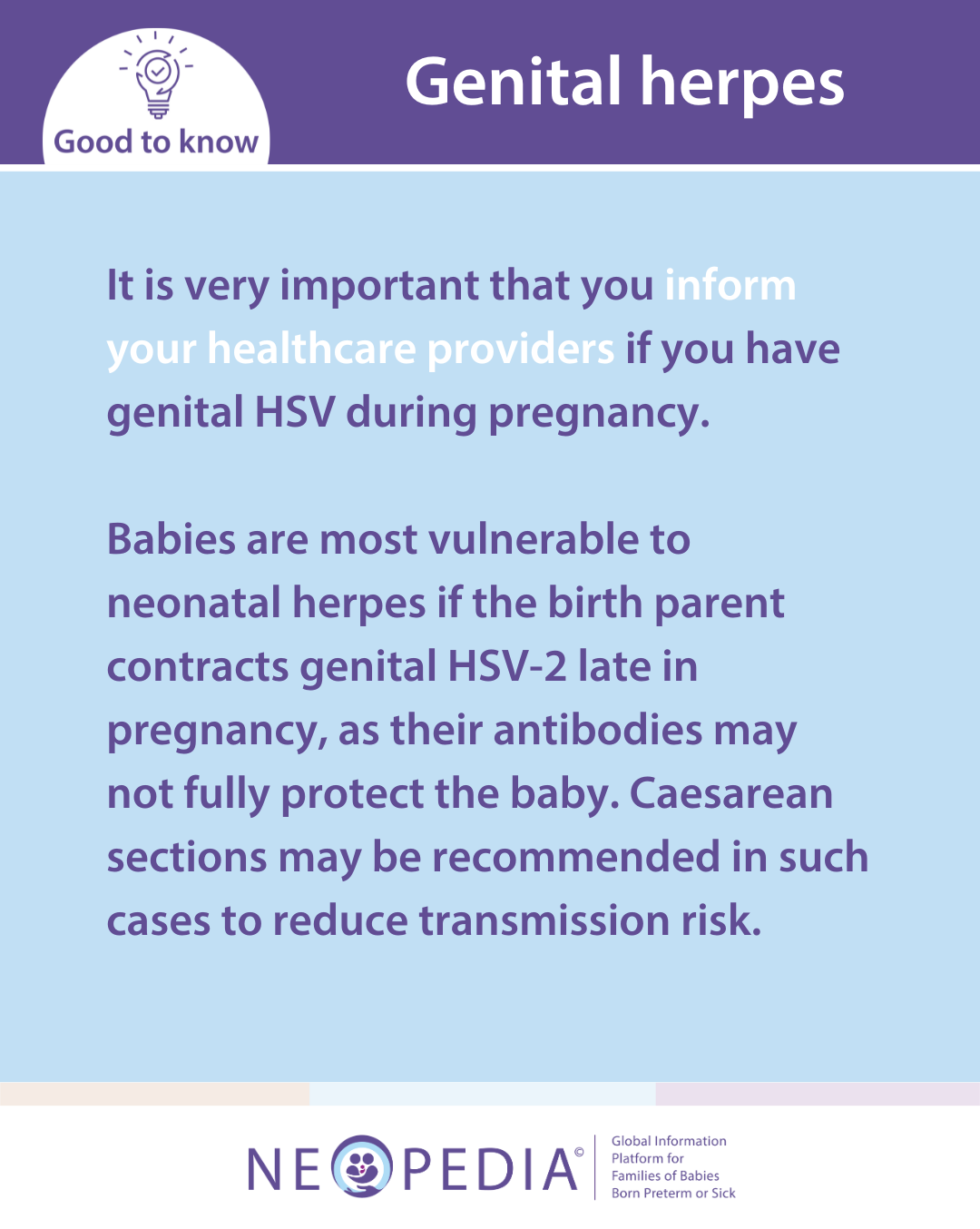
In newborn babies, an infection of the herpes simplex virus (HSV) is known as neonatal herpes. HSV is a highly contagious virus that usually spreads through direct contact between individuals.
It comes in two forms:
Newborns, especially those born preterm or with underdeveloped immune systems, are at risk of rapid HSV spread if untreated, potentially causing severe damage or in the most severe cases loss of life. The infection can occur during birth, through contact with HSV in the birth canal, or postnatally, via exposure to an active herpes infection on anyone close to the baby, including caregivers and healthcare professionals. In rare cases, babies can contract the virus in the womb⍰.
After birth, infection can happen through direct or indirect contact with active HSV sores, including through breastfeeding. Antiviral medication, usually administered intravenously⍰, is essential for treatment. Timely intervention is crucial, as delayed treatment can lead to serious illness.
Group B strep or Group B streptococcus (GBS) is a common bacterium in our bodies that usually does not cause harm and is not sexually transmitted. Testing for GBS is not standard in many countries’ pregnancy care but may be found incidentally during other tests or where available through private home kits. While the risk of GBS infection in babies is low, it can lead to severe conditions like sepsis⍰, pneumonia⍰, or meningitis⍰, especially if born preterm, if the parent has a fever during labor, or if labor starts late after waters break. Antibiotics⍰ during labor could prevent most early-onset GBS infections, particularly if the parent tested positive during pregnancy or had a previous GBS-affected baby. Prompt antibiotic treatment is crucial if the baby shows signs of GBS infection.
Due to the possibility of Group B streptococcus (GBS) transmission through skin-to-skin contact, it is important for everyone, regardless of GBS status, to thoroughly wash and dry their hands before handling a newborn baby, especially if preterm or sick.
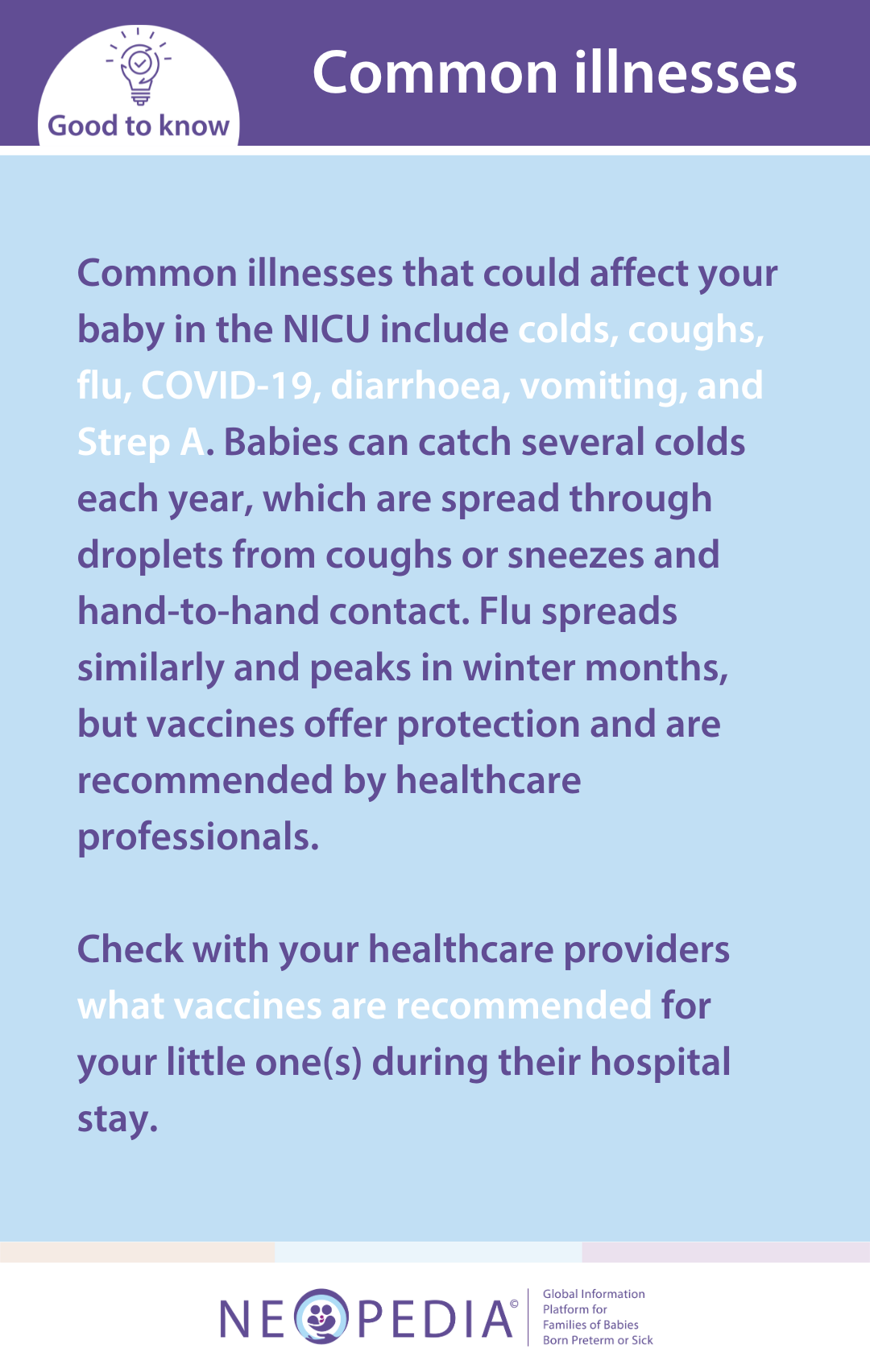
The most common viruses can spread year-round, but the risk increases during the colder months when people spend more time indoors, making transmission easier. This is particularly concerning for preterm babies and those with lung or heart conditions in the NICU, who are at higher risk of severe illness from infections.
Stomach bugs like norovirus⍰ and rotavirus⍰ are also common and highly contagious, spreading through close contact and contaminated surfaces or food. Norovirus, known as the "winter vomiting bug," can be caught anytime.
Strep A is a common bacterium causing infections like scarlet fever⍰, with higher rates in winter and spring. While preterm or sick babies are not more vulnerable to Strep A, it can still cause serious illness, so always talk to your healthcare providers if you suspect an infection.
Congenital cytomegalovirus (CMV) is a common infection for neonates, and it is part of the herpes virus family. It is a lifelong infection that remains dormant at times. While 4 out of 5 newborns with congenital CMV show no symptoms or disabilities, others may experience respiratory, auditory, and visual issues, along with mental disabilities. If your baby is diagnosed with symptomatic CMV, treatment is usually recommended, although it remains unknown to what extent aftereffects can be avoided.
